Newsletter June 2022
Who is... |
|
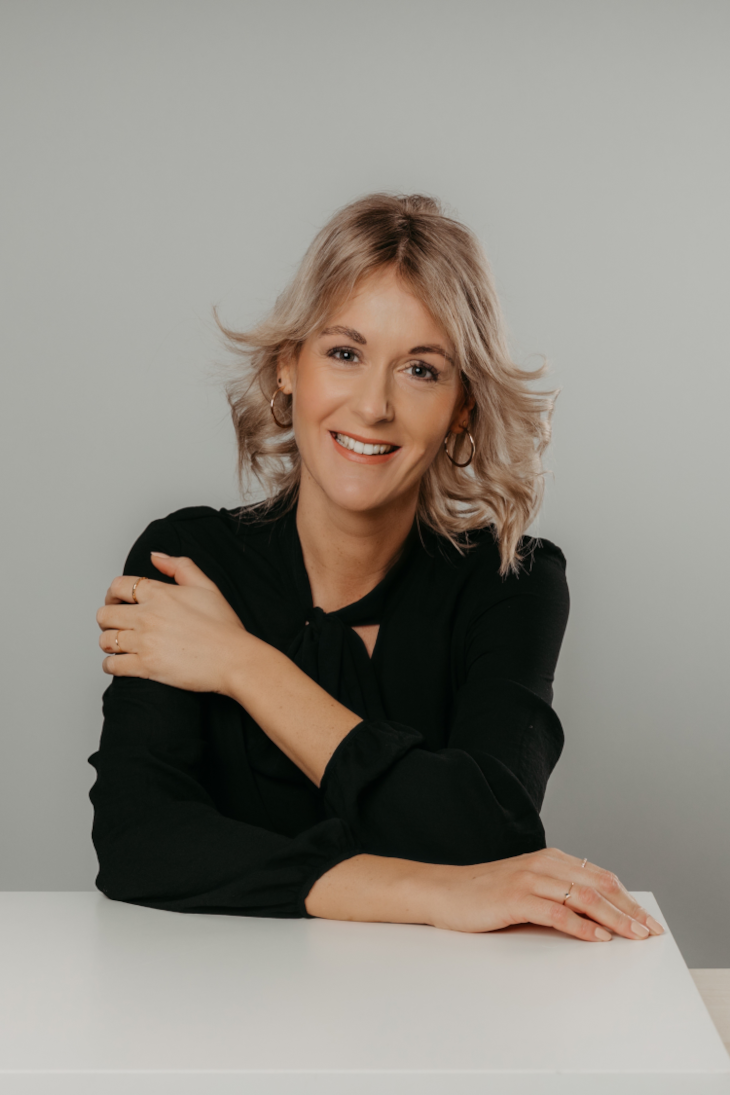
|
... COMETiN?
In this issue, project coordinator Jeanette Krumbach explains what is behind the COMETiN funding program and how female scientists can benefit from it in the early stages of their careers. COMETiN is a qualification program that offers young female scientists the opportunity to continuously and sustainably deal with the planning and implementation of their career steps within the framework of various modules and workshops, to expand their key academic qualifications, and to establish supportive relationships with female scientists*. The program supports the individual career development of female scientists from the doctoral phase onwards. How does the project work? COMETiN is a complete package of coaching, workshops, mentoring and the group of participants itself. What distinguishes COMETiN as a mentoring program is that we give female junior scientists the opportunity to go through this program within a group for 18 months. This is the great advantage and benefit of COMETiN. During this period, the participants come very close to each other as a group of young female scientists from various disciplines. Despite their different backgrounds, they are often in a similar situation in life and can benefit immensely from the exchange of experiences among each other. During the 18 months, the participants receive a wide range of workshops, individual and group coaching. The workshop content ranges from topics of strategic career development to personality development and training in body language and expression. COMETiN is also international and bilingual: We offer all content in German and English. In addition, a very important component of the COMETiN program is the establishment of a mentoring relationship. At the beginning of the program, participants receive a workshop in which they learn how to find and approach a mentor who will support them on their career path. Communication between mentor and mentee takes place at eye level. The mentors are given the opportunity to support young female scientists outside of hierarchical relationships and to pass on their own experiences. The mentoring relationship is not limited to the duration of the project, but can be continued beyond. This also promotes the networking of the participants with other scientists. How long will the project continue? The eighth and last COMETiN round started in April 2022 and will run until October 2023. After that, funding for the project from the federal government's program for female professors will end and we will have to look into the possibility of continuing the project at OVGU. How sustainable is participation in the project? Participation in the COMETiN program is sustainable in every respect and a gain for all young female scientists. In addition to the diverse workshop content, the great coaches and the mentoring relationship, the participants learn one thing above all: to grow beyond themselves and to have confidence in themselves and their own work. The energy of the group and the interplay of different experiences and skills makes the program unique and helps to advance one's scientific career. The group dynamic that develops through the different experiences and insights as well as diverse skills and competencies of the individual participants is a huge gain for all participants. But COMETiN is not only a sustainable offer for the participants. COMETiN also offers high added value for the mentors, who learn from each other. Mentoring is based on a supportive relationship and the exchange of experiences. On the one hand, the mentee benefits from the wealth of experience of her respective mentor. The mentor encourages and supports her mentee in her scientific and research career. The exchange helps the mentee to critically reflect on the opportunities and challenges of a scientific career and she gains formal and informal knowledge about the scientific community. In this way, all mentor*s make an active and sustainable contribution to the recruitment of young scientists and thus also gain the opportunity for self-reflection. In addition, they gain profound insights into the specific challenges faced by female junior scientists. What does COMETiN mean to you? First and foremost, COMETiN is an incredibly varied program for me. I am very grateful for the opportunity to meet and support so many great female scientists. It is very nice to be able to follow the personal development from the beginning of a run to the end and to see that the workshops and trainings bring success and how a strong group develops over time that benefits tremendously from each other. In addition, I can also identify very much with the participants and their careers. I myself have already worked in science and can understand what the participants are dealing with and what challenges they may be facing. On the other hand, because of my professional training, I am also familiar with the field of business and can therefore respond to the participants who might be interested in a career in business. For me, COMETiN is a program that I can recommend to every female scientist at the beginning of her career simply because it is so diverse and unique. Where else do you have the opportunity to come together with so many women scientists - who are all different because of their qualifications and experience, but who nevertheless face similar challenges? |
This is not what a feminist looks like! |
|
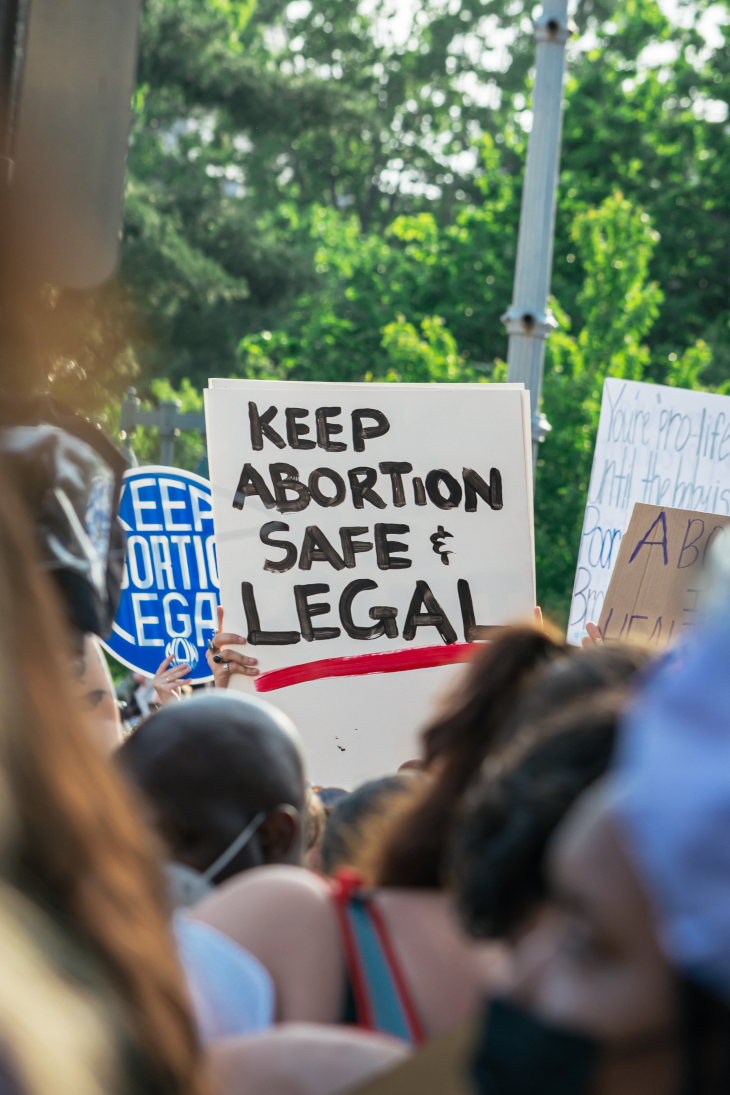
|
Abortion is a human right!
Recently, one of the biggest nightmares of US feminists came true: Roe v. Wade, the landmark ruling for abortion rights, has been overturned by the Supreme Court of the United States (SCOTUS). Without Roe, the number of official abortions will likely continue to decline, according to the New York Times. Women and other marginalized genders who live in a state where abortions are not legal will then have to take other measures, such as ordering abortion pills online or sometimes traveling far to reach a state where abortions are legal. Many individuals who have abortions are poor, and long travel distances can be insurmountable. Multiple marginalized individuals are particularly affected here, such as Black women and Women of Color. The states likely to ban abortions are primarily in the South, the Midwest, and the Great Plains. Because of the expected increase in interstate travel, the remaining clinics will most likely have less capacity to treat the women they can reach. An overview of the protests that have taken place since then and more info can be found here. And in Germany? While in the USA the abortion law was almost completely overturned, there is at least a partial victory for feminists in Germany. Section §219a, which is often misleadingly referred to as the "ban on advertising," has been deleted by the Bundestag. The coalition factions of SPD, Greens and FDP as well as the left-wing faction voted in favor of the deletion. The CDU/CSU and the AfD voted against. This means that gynecologists can now provide information on their websites about whether they perform abortions without being exposed to possible criminal prosecution, as was previously the case. The best-known example of this was recently the gynecologist Kristina Hänel. She was first convicted in 2017 for violating Section 219a. The repeal of Roe v. Wade represents a massive attack on the bodily self-determination of women and all persons who can become pregnant. Banning abortion only prevents access to safe abortions - abortions themselves have and always will exist. |
News in gender research |
|
|
Study: Reform proposals for parental allowance
Gender pay gap, gender care gap, social inequality - this study by the Friedrich Ebert Foundation (FES) vividly shows how strongly existing social structures are interwoven. In a practical way, the study points out multi-layered solution options to further exploit the potential of parental allowance as an instrument of a feminist and gender-equity oriented family policy, according to FES. The four reform priorities are "More partnership", "More intensive participation of fathers", "Social justice" and "Crisis-proof parental allowance". The reform proposals in the study are multifaceted and can be implemented in different ways: The "bronze" or "silver" levels presented in each focus area are reform proposals with comparatively less complexity and scope, which will be less complicated and more feasible in the short term. The possibility of combining reform ideas from the bronze, silver or gold levels, if necessary, promotes policy-making with different scopes and time horizons. Further information on the study and a free download are available here. |
|
|
Study: Accesses, Barriers and Potentials: Investigation on the International Mobility of Women Scientists
What is the potential of female scientists worldwide who could be attracted to a research stay in Germany? What are their needs for internationally mobile research? And what might be preventing women from doing so? The Alexander von Humboldt Foundation commissioned the Center of Excellence Women in Science and Research (CEWS) at the GESIS Leibniz Institute for the Social Sciences to investigate the access, barriers and potential of female scientists to international mobility. The results of the potential and needs analysis are now available. Data on the research and higher education systems and the participation of women in 14 countries worldwide were evaluated, including Spain, Poland, South Africa, Nigeria, India, the USA and Chile. At the same time, selected programs of the Foundation were examined from a gender perspective and recommendations for action were developed to attract more highly qualified female scientists to research in Germany and the Foundation's network. The results of the study are available here. |
|
|
Health research toolkit
The Catalan Institute of Health has developed a toolkit, also available in English, to better bring the perspectives of biological and social gender into research content. Question lists and references provide good guidance for planning research projects. |
|
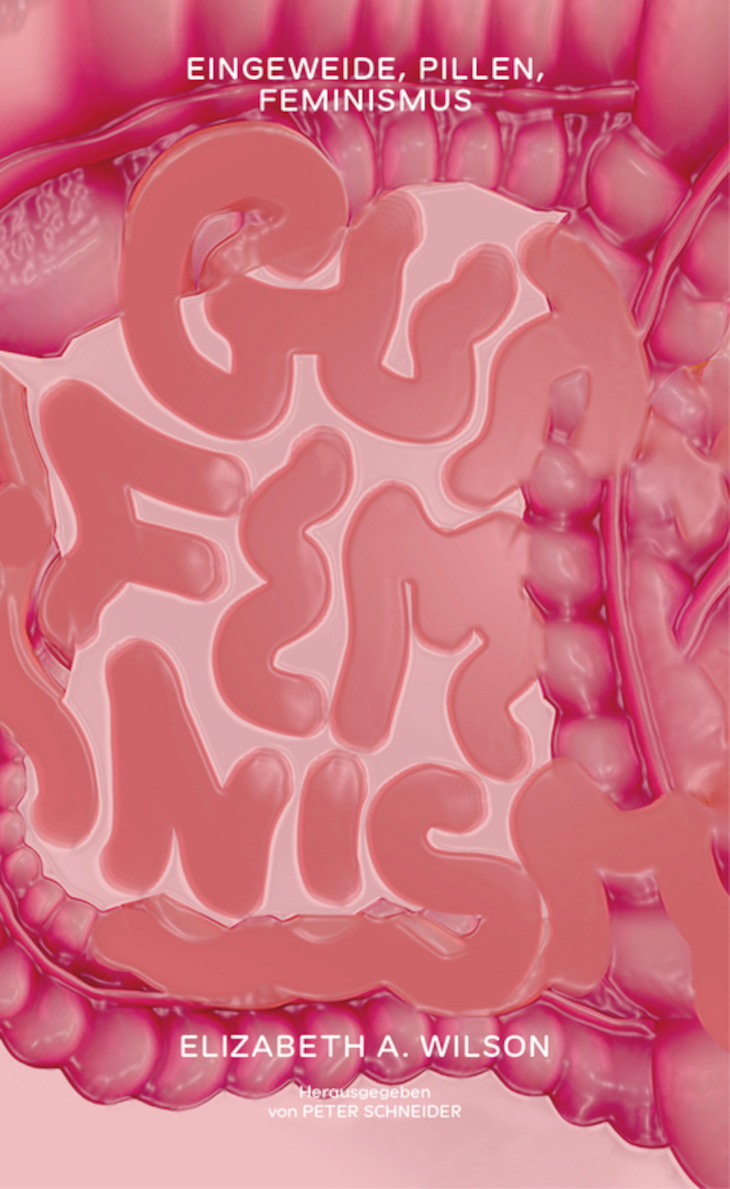
|
Publication: "Gut Feminism" (2015) by Elizabeth Wilsons now in German
Drawing on empirical data from neuroscience, psychoanalysis, and deconstruction, Elisabeth Wilson not only reformulates in "Gut Feminism" her longstanding preoccupation with the biological body, depression, and its pharmaceutical treatment, but proposes that feminist politics should be "radically negative" and embrace its own damaging potential. In doing so, Wilson not only challenges previous "affirmative" or "reparative" readings of feminist neo-materialisms, but emphasizes (unconscious) aggression, loss, and harm in queer theory's "reparative turn." A full review by Sarah Sandelbaum is available here in the Open Gender Journal. Elizabeth A. Wilson: Eingeweide, Pillen, Feminismus.
translated by Herwig Engelmann
Zürich: Edition Patrick Frey 2022
451 S., ISBN: 9783907236369, 12,00 €
English title: „Gut Feminism“, Duke University Press 2015 |
University and politics |
|
|
Online dictionary “Gender in simple Language”
The Kompetenzzentrum geschlechtergerechte Kinder- und Jugendhilfe Sachsen-Anhalt e.V. has created a gender glossary in simple language. 90 terms from the field of gender and diversity are explained on a barrier-free website in simple language. It was developed together with the translator Anne Scheschonk and the test group "We understand each other." of the Lebenshilfe Mansfelder Land e.V., it says on the website. The glossary is available here. |
|
|
Bullying and abuse of power at universities
Yolande Jansen, Natalie Scholz, Susanne Täuber and Remco Tuiner report in the article "Mobbende ProfessorInnen: Intimidation and Abuse of Power at Dutch Universities" about conditions at Dutch universities. "In this article, we highlight abuse of power as a structural grievance in academia and show how the structures that should put a stop to this abuse often exacerbate the problem in practice," the authors say. |
|
|
University of Cologne appoints racism officer
The University of Cologne has become the first university in Germany to appoint a racism officer. The position is held by Prof.in Katajun Amirpur, Professor of Islamic Studies. She forms a central point of contact on the topic of racist discrimination and wants to work against racism in all areas of the university - especially in teaching, research and administration. In addition, the counseling services for students are to be expanded. The fact that this position now exists at the University of Cologne should also be understood primarily as making structural racism at universities and colleges visible, according to Amirpur: "The fact that Cologne is now the first university in Germany to establish this representative function for racism criticism does not mean that we have more racism at the University of Cologne than elsewhere, but that we are actively tackling the problem." She took up her new post on 01 April, which is initially limited to two years. |
|
Events |
|
|
Online-Panel: Researching War and its Aftermath through a Feminist Lens I July 7
The panel discussion is part of the event series “Transnational Feminist Dialogues on Gender, Conflicts and Social Justice” and brings together speakers from different disciplinary and regional contexts to discuss the challenges of doing research in/on conflict and post-conflict settings from a feminist perspective. The aim is to jointly discuss some of the issues that have been brought to by the Russian invasion of Ukraine, but that are relevant to feminist conflict research more generally, including the importance of feminist methods/ethics in conflict research and the question of what conflict aspects it can highlight which are usually overlooked by more traditionalist research and reporting on war and violence; masculinity and its role in conflict; the relationship between policy making and knowledge production about gender/sexuality; and finally, the challenges of amplifying feminist/critical approaches in broader disciplinary discussions which are often dominated by realist war and security studies. Panelists: Lina M. Céspedes-Báez (Universidad del Rosario, Colombia) Milli Lake (London School of Economics and Political Science, UK) Lewis Turner (Newcastle University, UK) Moderation: Hannah Franzki, Jannis Grimm and Mariam Salehi (INTERACT, FU Berlin) Please register here.
|
|
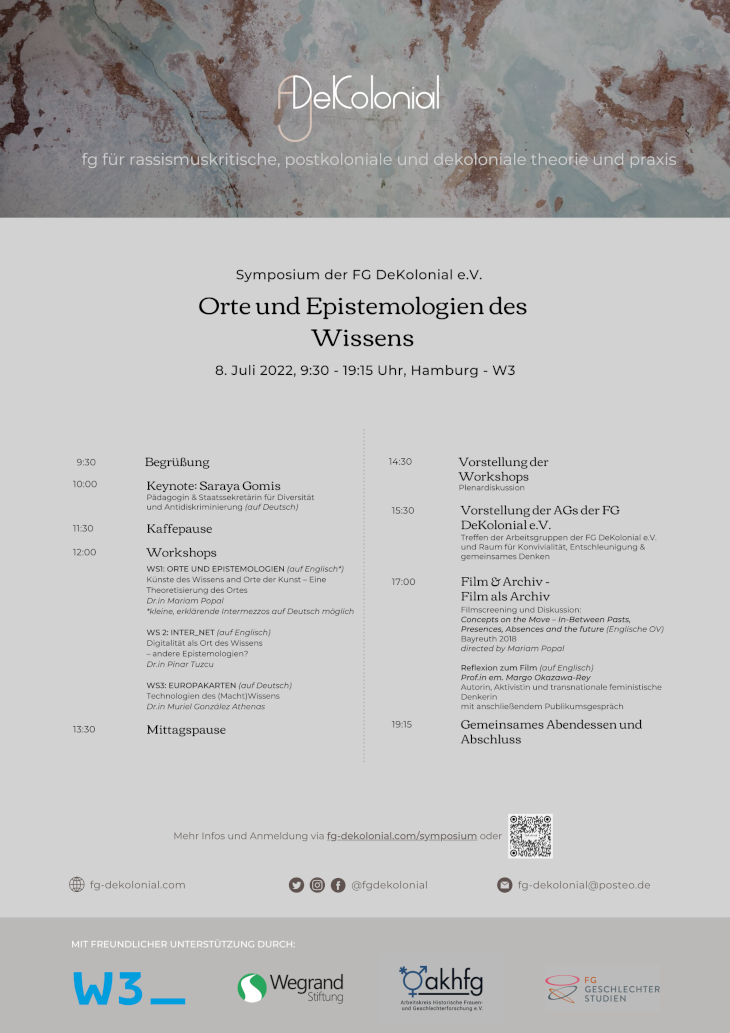
|
Symposium: Places and Epistemologies of Knowledge I July 8, Hamburg
In The Place of the Idea and the Idea of the Place (1996), the writer and winner of the Nobel Prize for Literature Toni Morrison, in a poetic speech at Princeton University, poses the question of the connection between place and the idea of the generation of knowledge, and in this way, not only produces a critical, literary text, but also creates another kind of knowledge that gently questions the university as a place of knowledge. The university, commonly understood as the authorized site of knowledge, is also being questioned from other quarters. Jacques Derrida, in particular, has both challenged and reset the university as the site of knowledge generation, especially in L'Université sans condition (2001). In the volume Another Knowledge is Possible - Beyond Northern Epistemologies (2008), again Boaventura de Sousa Santos, Joao Arriscado Nunes, and Maria Paula Meneses invite us to illustrate and work with the multi-layered theoretical and practical global epistemologies and their incorporation into established knowledge and its generation. |
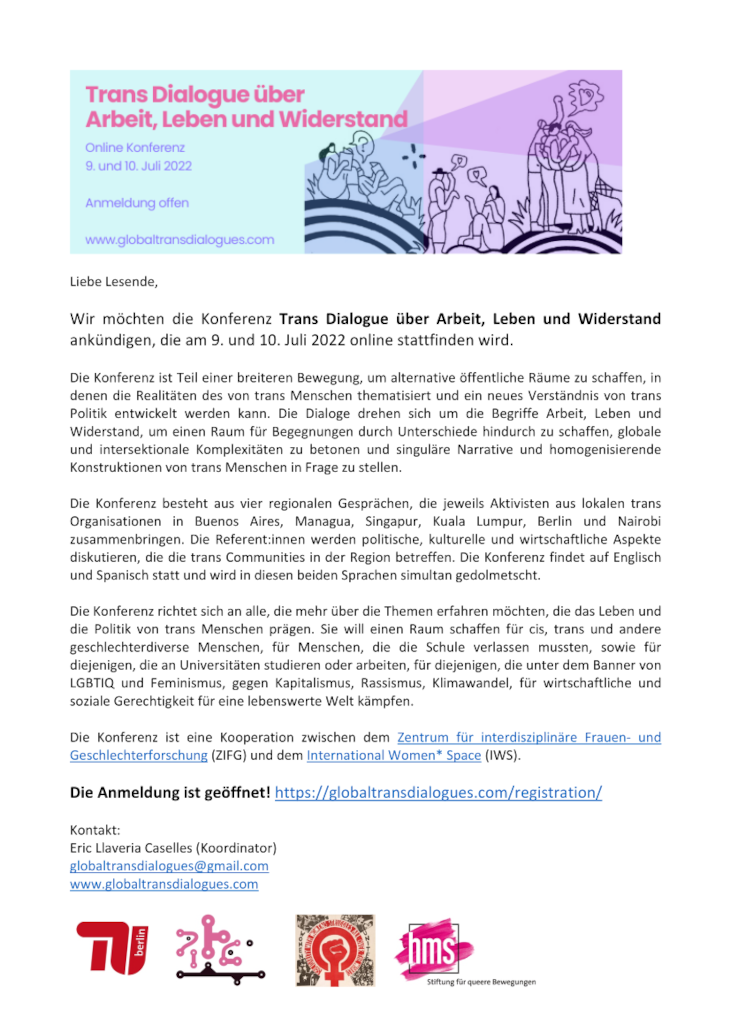
|
Online Conference: Transdialogues on Life, Work and Resistance I July 9-10.
The Trans Dialogues on Life, Work, and Resistance conference is part of a broader effort to create alternative public spaces to learn about the realities of being trans and to construct new understandings of trans politics. The conference is built around the concepts of work, life, and resistance because of the openness of their meanings, in the hope that they can sustain a space of encounter across difference. The conference emphasizes global and intersectional complexities, challenging singular narratives and homogenizing constructs of trans people. The conference consists of four regional conversations, each bringing together activists from local trans organizations in Buenos Aires, Managua, Singapore, Kuala Lumpur, Berlin, and Nairobi. Invited speakers will discuss political, cultural, and economic issues affecting trans communities in the region, focusing on issues of citizenship, labor, education, and health care. They will also reflect on their experiences as activists, sharing how they respond practically and politically to the specifics of each context in their struggle for a better life for trans people. The talks will also address issues of alliances between political movements and look at the role of research and educational institutions. The conference will be held in English and Spanish with simultaneous translation into both languages. The conference is for anyone, who wants to learn more about the issues that shape and influence the lives and politics of trans people. The conference aims to create a space for cis, trans people and all other genders, for people who have had to leave school, as well as for those who study or work in universities, for domestic workers, sex workers and all other workers, paid or unpaid, for those who struggle under the banner of LGBTIQ and feminism, against capitalism, racism, climate change, for economic and social justice for a better world. |
|
Online-Panel: Resistance, Activist Practices and Social Movements I July 21
The panel discussion is part of the event series “Transnational Feminist Dialogues on Gender, Conflicts and Social Justice” and brings together speakers working on different regional contexts to discuss the contentious forms of challenging contemporary agrarian, environmental, and climate conflicts. The event is convened by the Junior Research Group “Food for Justice” (BMBF, FU Berlin), which focusses on social mobilization targeted at injustices in the food system to establish a dialogue with researchers working on conflicts triggered by extractivism and anti-ecological authoritarianism. Focusing on different levels of resistance, the aim is to jointly discuss the understanding of those practices that run between everyday resistance, and more organized forms of collective action, in which protesters gather in broader social or political movements to challenge authorities or hegemonic powers in national or transnational realms. In this event we want to revisit those questions that inspired the series to ask about the actors that engage in resisting agri-food, environmental, and climate conflicts and the strategies used by them, but also about the complexities and particularities of the resulting activist practices from a gender-based perspective in different contexts. Panelist: Janet Conway (Brock University) Sabrina Fernandes (University of Brasilia) Camila Ponce Lara (Philipps Universität Marburg) Marco Antonio Teixeira (Freie Universität Berlin) Moderation: Renata Motta (Project Leader, Junior Research Group “Food for Justice”, Freie Universität Berlin) Organizer: Dr. Sabina García Peter More information: mvbz@fu-berlin.de Registration: www.mvbz.fu-berlin.de/registration-tfd |
|
|
Online conference: Female Science Talents GATHERING 2022 I July 28-29
On the 28th and 29th of July 2022, the Falling Walls Foundation will once again be hosting its annual online networking event, the Female Science Talents Gathering. The goal is to bring together female science talents from all over the world to share their experiences and introduce their projects. The conferences purpose is to help boost the careers of female scientists by creating a space within which to build personal connections with like-minded women determined to reach their ambitions and contribute to a more inclusive and just world. The gathering will be comprised of interactive networking activities, panels with engaging discussions, as well as the chance to learn from high profile female leaders from academia and industry during role model talks and panel discussions. |
|
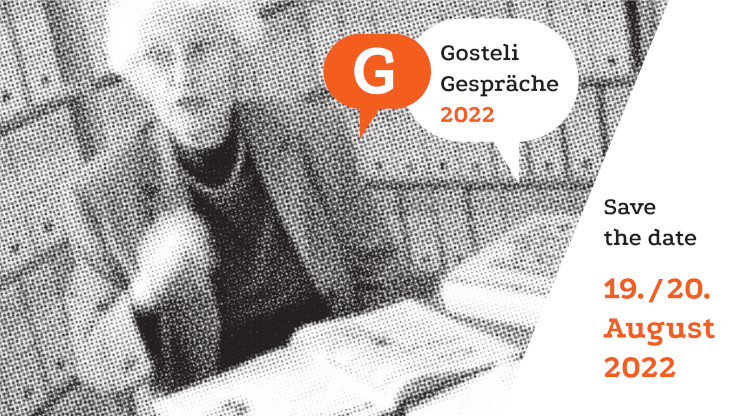
|
Save the Date: "Gosteli Talks" and 40th Anniversary Gosteli Foundation I August 19-20, University of Bern
On August 19, 2022, the "Gosteli Talks", a collaboration between the Gosteli Foundation and the Interdisciplinary Center for Gender Studies at the University of Bern, will take place for the first time. Under the title "Staying with the Trouble: Women's History Today," two panels, a podium, and the keynote address by Prof. Dr. Caroline Arni will shed light on various aspects surrounding women's history. |
|
Hybrid conference: Bridges between disciplines: Gender in STEM and Social Sciences I September 12-16, Gandía – Valencia, Spanien
The main aim of this conference is to think about gender differences in Science(s) from an intersectional perspective, bridging the gap between what have been thought of as separate and decoupled fields of knowledge (STEM – Science, Technology, Engineering, and Mathematics- and Social Sciences). There are multiple forms of inequality and discrimination in Academia. But, how are these experiences of difference addressed in terms of scientific knowledge production? Are we thinking in terms of inter-disciplinary understanding and action? What are we doing in our respective disciplines? How is this affecting the science we produce? All these questions have informed this initiative and prompted us to go further in terms of common horizons and transformative action. By bringing STEM and Social Sciences together we intend to interrogate gender and Science from a comprehensive understanding of differences and diversity. The detailed program is available here. More info about registration & ticket costs here. |
|
Grants and prizes |
|
|
Science Prize of the German Bundestag 2023 I Deadline: July 15 Wissenschaftspreis des Deutschen Bundestages 2023 I Frist: 15. Juli
In 2023, the German Bundestag will again award the Science Award. The Science Award of the German Bundestag recognizes outstanding recent scientific work that stimulates the study of parliamentary issues and contributes to a deeper understanding of parliamentary practice. |
|
|
Anne Klein Women's Award 2023 I Deadline: August 15
With the Anne Klein Women's Award, the Heinrich Böll Foundation honors women who courageously and persistently stand up for human rights, equal rights and sexual self-determination. The prize is endowed with 10,000 EUR and has been awarded since 2012. The honorees come from Germany and abroad. |
|
|
Call for entries: Commitment Award of the Saxon State Women's Council I Deadline: August 10
The Landesfrauenrat Sachsen e.V. (Saxony Women's Council) will award the Commitment Prize for the eighth time in 2022. This prize is awarded to a woman, a women's association/association or a women's association/initiative that is particularly active in Saxony in the area of equal rights in accordance with Article 3 of the Basic Law. The theme of the 8th Commitment Award is "Women in Politics - Political Participation of Women". The award winners should be particularly active in this area. |
|
|
EU project GENDERACTIONplus just launched
On June 8, 2022, the Horizon Europe project GENDERACTIONplus officially started with a kick-off meeting in Prague. The project goal is to advance gender equality in the European Research Area, for example through exchange and coordination at the political level and through corresponding recommendations. Through these activities, the project will help to support the coordination of gender equality policies and their integration into the European Research Area (ERA). This will involve both governmental institutions and research funding organizations. GENDERACTIONplus will focus on five thematic areas that link to ERA policy (ERA Policy Agenda):
GENDERACTIONplus is the successor project to GENDERACTION, which ended in 2021 and was funded under Horizon 2020. DLR Projektträger was/is involved in both projects through the Contact Point Women into EU Research. The GENDERACTIONplus consortium is exceptionally large: it consists of 26 institutions from 21 European countries. It is coordinated by Marcela Linková from the Czech Republic. |
|
|
New EU information service: Everything about lump-sum funding (lump-sums)
The European Commission offers a new service: All information about lump-sum project funding is now summarized on a single website. Applicants can find information on current events on the topic of lump-sums, slide sets, the quick guide and also background information on the topic. Read more here. |
|
Call for Papers |
|
|
Call for Papers: Social relations of nature and global environmental crisis - transdisciplinary gender and intersectionality research on climate change and sustainability I Deadline: July 11
Man-made climate change has preoccupied science and politics for decades and is increasingly coming into the law. Social natural conditions have changed since industrialization to an extent that calls into question global (over)life on earth. Already at the beginning of the seventies, the report to the Club of Rome referred to the "limits to growth". The organization of the economy was thus named early on as a driver of the ecological crisis. Sociological analyses place the impending ecological collapse in the contradictory process of social modernization. Feminist positions understand the counter-gendered hierarchies that underlie the relationship between humans and nature as the fundamental cause and concrete expression of the global environmental crisis. These hierarchies are perpetuated in climate policy and law. At the same time, feminist perspectives hold visions of how the human-nature relationship can be rethought. Political processes at different levels, from the global to the local, have attempted to politicize and regulate the environmental crisis for more than thirty years. From the 1992 World Summit on Environment and Development in Rio de Janeiro, which established the Framework Conventions on Climate Change as an international legal framework, to the Fridays for Future movement or the "climate lawsuits," there have been and continue to be numerous approaches to seeing climate change not as a phenomenon to be studied purely in terms of natural science, but as a social conflict that must be negotiated and managed politically. The proposals for doing so are diverse. They range from legal regulation according to the polluter-pays principle to demands for sustainable development and the overthrow of the capitalist economy. In this context, decolonial perspectives are increasingly gaining importance, pointing out the historical connection between colonialism and climate change and its continuities in order to demand global social and environmental justice. At the same time, seemingly neutral legal, political, and scientific tools and discourses are shaped by cultural assumptions and narratives. These narratives shape ideas about what is valuable about nature and worth protecting, or much more fundamentally, what is considered nature and thus natural.
At the same time, multiple forms of protest, resistance, and legal action have always been part of environmental politics. The scope of each of these forms of action varies and is shaped by social discourses and power relations.
In extreme cases, the interactions between humans and the more-than-human world are beyond political control, as the coronavirus pandemic clearly demonstrated. Looking to the future, the question of such interactions is increasingly acute.
Contributions from all disciplines are welcome, especially those that take intersectional approaches and explore the complexity of social relations of nature and the global environmental crisis. Abstracts for the 20-minute presentations each should be no more than 400 words in length; also required is the submission of a concise short biography (50-100 words). Abstracts and short biography must be sent in English or German to ztg-sekretariat@hu-berlin.de by July 11, 2022. |
|
|
DisAbility and Gender History. Intersectional Perspectives on Disability and Gender I Deadline: July 15
The 16th workshop of the Research Focus Women's and Gender History of the Faculty of Historical and Cultural Studies at the University of Vienna, which will take place on Friday, November 4, 2022, is dedicated to the intersections of disAbility History and Gender History. |
|
|
12th ZSM conference 2022: Discussing deal images of research and scientific careers
Against the background of the conference topic that addresses the ideal images of research and scientific careers, two strands are considered that are interwoven with being a scientist: "ideal research" and "ideal scientific careers". With increasing experience in the scientific working world, ideal images can become fragile and thwarted, but their normative power remains. The conference is intended to open up the possibility of reflecting on ideal images of research and scientific careers against the background of a theoretical and empirical break and, in particular, of addressing the (hidden) potential of deviating. Errors are inevitable, or to put it another way: the error is scientific. Nevertheless, there is no open discourse on errors and the potential for mistakes and detours remains unaddressed. This non-addressing of deviations from the supposed ideal may prevent new insights, which make elementary contributions to the theoretical development and the discourses of the scientific community due to their claim to innovation. With regard to the symposium, contributions are welcome on (outdated) research ideals, clarifying errors or error processing and dealing with them, e.g. in the subject areas: ➢ Triangulation to enable overlapping perspectives in research projects, which can lead to mismatches in the different methodological and methodological approaches ➢ Quality criteria of qualitative research as a compass for "good" research, which, with increasing complexity, lead to challenges ➢ Dealing with hypotheses as well as skepticism and criticism (e.g. when applying for third-party funds and submitting exposés) as markers of scientific knowledge ➢ Wrong ways and tentativeness, which are part of everyday life as a researcher, and at the same time the negation and concealment of errors, detours and research fails (e.g. unsuccessful interviews, poor planning in research design, logical fallacies) ➢ Constructive discussion of (avoidable) errors and mistakes in research designs, method selection and implementation, etc. as evidence of good scientific practice Scientific careers are embedded in a productive, insightful and at the same time exciting field in which various possibilities of being a scientist are possible. Areas of tension between ideal images and real images can appear on different levels (#IchbinHanna or #IchbinReyhan) and in topics such as working conditions, pressure to perform, competition, normative setting of research standards, self-submission and self-exploitation in self-realization, dynamics of the scientific field, research logic as well as the self-image as a researcher. Depending on the personal location of the researchers, these topics appear in different facets. The juxtaposition of ideal images of scientific careers with found conditions can raise dilemmas that can be the starting point for a critical survey at the conference. Contributions to the following topics, among others, are welcome as part of the symposium: ➢ Inter- and transdisciplinarity as support for the generation of knowledge and at the same time making it more difficult to locate oneself in the scientific field ➢ Meritocratic promise as a promise of advancement through diligence and skill with unsteady career paths and precarious work situations at the same time ➢ Publishing to communicate new findings with simultaneous pressure to increase reputation and chances in the field of science through any publication ➢ Claim of self-reflection as a scientist and on the other hand a lack of identification of one's own positions in the field and society, which have an impact on knowledge ➢ Family orientation, compatibility or work life balance and science: difficulties vs. best practice models ➢ Narrative of equal opportunities in society and science, but at the same time an under-representation of e.g. women or POC as researched or researching subjects The organizers look forward to contributions that relate to the above-mentioned topics or related issues, and those that cut across the topic areas. They welcome empirical, theoretical and conceptual contributions that produce "ideal research" and "ideal scientific careers" in various fundamental theoretical perspectives (e.g. profession theory, theory of inequality, theory of socialization, theory of power, in front of the foil of social worlds and arenas, etc.). Parallel working groups are planned as a format for lecturers (approx. 20 min. lecture + 20 min. discussion), which will be framed by a topic-specific accompanying program (keynote, workshop, evening event). Abstracts with proposed contributions of no more than 3,000 characters should be submitted to zsm@ovgu.de by July 22, 2022. The contributions are selected in a peer review process, and feedback will be given by the end of August. The conference will take place from November 11th to 12th, 2022 at the Otto von Guericke University & the Forum Gestaltung in Magdeburg. Further information about the conference can be found here. The conference fee of 55 euros includes meals with non-alcoholic drinks, coffee, tea, pastries and snacks during the conference period as well as dinner together on Friday (excluding drinks). Contributors are exempt from the participation fee. The aim is to publish a conference proceedings as an Open Access publication, in which the contributions that have successfully passed a peer review process will be included. The conference takes place in cooperation with the Office for Equal Opportunities of the OVGU and with the kind support of the Hans Böckler Foundation. |
|
|
Call for Action: Unruly Speeches, unruly Women I Deadline: July 31
For the second time, women are called upon to write an unruly speech and submit it on ungehalten.net by July 31, 2022 at the latest. |
|
|
Call for Action: Affective Histories of Queer and Trans Activism I Deadline: August 1
How have queer and trans activists challenged the repressive status quo in the past? Which forms have queer and trans activism taken over the decades? What role do emotions and affects play in activism – and how can affect theory be utilized in the study of queer and trans histories and temporalities? These are among the questions that we wish to see discussed in the SQS Special Issue on Affective Histories of Queer and Trans Activism. Historical struggles:
Forms of activism:
Current engagements with LGBTQ+ histories:
The Special Issue will be published in SQS Journal, which is a peer-reviewed open access journal, published by The Society for Queer Studies in Finland. In addition to peer-reviewed articles, the journal also accepts e.g. opinion pieces, essays, and book reviews. Please indicate in your abstract which section of the journal your submission is targeted at (see author instructions: https://journal.fi/sqs/about/submissions). For this special issue, we prefer submissions in English, but following the trilingual language policy of SQS, submissions in Finnish and Swedish will also be considered. |
|
|
Call for Papers: 8th Interdisciplinary Workshop Critical Sex Work Research I Deadline: August 15
The Society for Sex Work and Prostitution Research (Gesellschaft für Sexarbeits- und Prostitutionsforschung), founded out of the Critical Sex Work Research Network, brings together researchers from different disciplines. It promotes an interdisciplinary scientific discussion and debate on prostitution and sex work as well as the development of new research perspectives on the topic. This year's workshop also offers students and academics in the qualification phase a collective space to discuss their own current work on the topic away from established, stigmatizing and criminalizing discourses and debates. The thematic framing is deliberately kept open and oriented towards the input of the participants. The workshop is primarily aimed at students with work in progress, doctoral students as well as post-docs from all disciplines who are working on the topic of prostitution or sex work and who would like to discuss their research. Sex workers, social workers and (scientific) project collaborators are also cordially invited. The aim is to promote interdisciplinary exchange in a low-threshold setting and to discuss methodological challenges in the context of prostitution and sex work research. Speakers will present their own current research projects or contribute data material for joint discussion. The focus can be on conceptual and methodological questions as well as on individual and discipline-specific approaches. The referee's contribution can be either a lecture (20 minutes lecture, 25 minutes discussion) or a working group (90 minutes incl. discussion) in a preferred format, e.g. discussion of sources, data material, research diary, draft texts or theoretical approaches. The contribution proposal of maximum 2,000 characters (including spaces) can be submitted as a PDF file via email to veranstaltung@gspf.info by August 15, 2022. The contribution format (lecture or working group), contact details, disciplinary location as well as the status of the own research should be indicated. Feedback on the proposal will be provided approximately four weeks after the submission deadline. |
|
Dear Dorothea... |
|
|
... what is the current state of abortion law in Germany?
After the look at the USA, a brief look at Germany follows. What is the situation regarding abortions here? History Since 1871, Section 218 of the German Criminal Code made any termination of a pregnancy punishable in principle, according to a historical overview by the Federal Agency for Civic Education (BpB). Abortion was punishable by between six months in prison and five years in the penitentiary. From 1927, an exception was made at least for abortions for medical reasons. However, a more far-reaching regulation failed to materialize. The debate reignited with the feminist struggles in the 1970s and the famous issue of Stern magazine in which 374 women, including celebrities such as Romy Schneider, confessed that they had had abortions. Even then, activists criticized that the abortion issue also represented a class issue: Those with money will always have access to abortion. |
|

Thank you very much for your interest! You are welcome to forward the newsletter. To register, please send a message to gleichstellungsbeauftragte@ovgu.deor register on the Website. The Office for Equal Opportunities at the Otto-von-Guericke-University Magdeburg is now on Instagram! |





